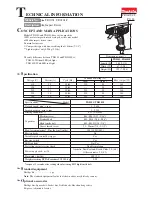
9
3. If the battery pack does not charge properly:
a. Check current at receptacle by plugging in a lamp or other appliance
b. Check to see if receptacle is connected to a light switch which turns power off
when you turn out the lights.
c. Move charger and battery pack to a location where the surrounding air
temperature is approximately 65°F - 75°F (18°- 24°C).
d. If charging problems persist, take the tool, battery pack and charger to your
local service center.
4. The battery pack should be recharged when it fails to produce sufficient power on
jobs which were easily done previously. DO NOT CONTINUE to use under these
conditions. Follow the charging procedure. You may also charge a partially used pack
whenever you desire with no adverse affect on the battery pack.
5. Foreign materials of a conductive nature such as, but not limited to, steel wool,
aluminum foil, or any buildup of metallic particles should be kept away from charger
cavities. Always unplug the charger from the power supply when there is no battery
pack in the cavity. Unplug charger before attempting to clean.
6. Do not freeze or immerse charger in water or any other liquid.
Shock hazard
. Do not allow any liquid to get inside charger.
Never
attempt to open the battery pack for any reason. If the plastic housing of the battery pack
breaks or cracks, return to a service center for recycling.
INSTALLING AND REMOVING THE BATTERY PACK FROM THE TOOL
Make certain the lock-off button is engaged to prevent switch actuation
before removing or installing battery.
TO INSTALL BATTERY PACK: Insert battery pack
into tool as shown in
figure C
.
TO REMOVE BATTERY PACK: Depress the battery
release button as shown in
figure D
and pull battery
pack out of tool.
:
:
D
C
90550107 PC1800ID, PC1200ID 4/1/09 9:33 AM Page 9










































